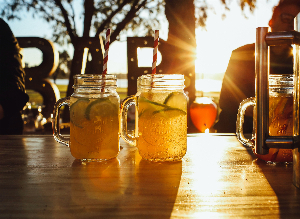Alcohol and hot weather: what are the risks?
Published Jul 28, 2022 • By Berthe Nkok
Summer is the perfect season for picnics and barbecues. However, when the temperatures rise, you need to be careful and avoid alcohol as it does not mix well with the heat.
What are the dangers of alcohol consumption in hot weather?
We explain it all in our article!

In hot weather, it can be tempting to have a drink to cool down. Although cold drinks, especially alcoholic ones, give a feeling of well-being, the body does not react well to them.
Alcohol should be consumed in moderation for many reasons. For example, in the short term, there is a risk of dangerous behavior such as being aggressive with other people, drunk driving, etc. And in the long term, there is an increased risk of cancer and cardiovascular disease. Drinking alcohol in very hot weather, especially when you are out in the sun, exposes you to even more adverse effects.
What are the dangers of alcohol consumption?
Alcohol is a psychotropic drug. It alters consciousness and perception, and thus has an impact on our emotions and behavior. The direct effect depends mainly on how much alcohol your drink contains.
Alcohol consumption can trigger the development of many diseases, even for people who do not drink a lot or who are not dependent on it: cancers, cardiovascular disease, digestive disorders, nervous system and psychiatric disorders, etc.
Alcohol and cancer
Drinking alcoholic beverages increases the risk of certain types of cancer: one glass per day is enough. This risk is the same regardless of the type of alcohol consumed (wine, beer or liquor), because it is the alcohol molecule (ethanol) that is carcinogenic.
Seven types of cancer have been shown to be associated with alcohol consumption of more than one drink per day: cancer of the mouth and throat (larynx and pharynx), esophagus, liver, colon and rectum, and breast.
The combination of alcohol and tobacco further increases the risk of mouth and throat cancer.
Alcohol and cardiovascular diseases
Regular alcohol consumption increases your blood pressure and the risk of suffering with arterial hypertension (high blood pressure). It also increases the risk of brain hemorrhage and can cause cardiac arrhythmias (heart rhythm disorders). In addition drinking too much alcohol in a too short period of time can cause arrhythmias and increase the risk of sudden death.
Alcohol and cirrhosis
Alcohol is a major cause of cirrhosis in people addicted to it, but also in regular or excessive drinkers. In the long term, cirrhosis can develop into liver cancer.
The impact of alcohol on the brain
Regular and excessive alcohol consumption can lead to cognitive problems: impaired memory, planning skills, attention and decision-making.
The earlier the drinking begins, the greater the damage to the brain.
What are the dangers of hot weather?
Heat puts a strain on the human body: our thermoregulatory mechanism can be overwhelmed and heat-related symptoms such as fatigue, headaches, fever and sleep disorders can occur. These can be precursors to serious accidents such as dehydration, which means an excessive decrease in tissue water content, or sunstroke after excessive exposure to the sun.
The human body uses a mechanism that requires not only energy but also a great capacity for adaptation, to regulate its own heat. As a result, the elderly, people with chronic diseases, children, babies and even pregnant women are among those most at risk from the heat.
In older people, the number of sweat glands (which produce sweat) decreases with age, affecting the body's ability to cool itself. They are no longer very sensitive to thirst and so may not notice that they are dehydrated.
Cardiovascular risk also increases during heat waves, and this is true for the general population. For example, strokes and thromboembolic diseases such as phlebitis and pulmonary embolism can occur.
High temperatures expose people with chronic diseases to decompensation (loss of compensatory mechanisms that keep a diseased organ or system in a more or less precarious balance, which is often caused by comorbidities). Thus, conditions that were more or less stable until then, such as cardiovascular diseases, kidney problems, type 1 and type 2 diabetes, or neurological and psychiatric disorders suddenly worsen, either reversibly or irreversibly. Dehydration also affects the kidneys, increasing the risk of renal colic.
What are the risks of drinking alcohol in hot weather?
Every time alcohol is consumed, the body's natural temperature regulation mechanism is disrupted. Ethanol is a vasodilator, i.e. it dilates the blood vessels, thus facilitating the flow of the heat from the body to the skin and increasing its temperature.
Alcoholic beverages, especially cocktails, are usually very sweet. However, sugar prevents the body from storing water. When sugar is consumed, the body uses water reserves to regulate the sugar level. In addition, alcohol, especially red wine, can make you hot and cause you to have hot flashes.
If it is very hot outside, this can quickly become a problem. Hot flushes and redness, caused by stagnant blood under the skin of the face, can appear rather quickly. After that, the body easily exceeds its normal temperature of 98,6° F and hyperthermia occurs immediately.
In addition, alcohol is a diuretic, which means that it promotes the elimination of water from the body. In fact, it causes the kidneys to release more water than usual through urine and sweat. In addition, the amount of water eliminated is usually greater than that provided by alcoholic beverages and this increases the dehydration already caused by alcohol consumption, leading to dry mouth and skin.
The combination of all these factors leads to heat stroke or hyperthermia. Convulsions, headaches, nausea, vomiting and dizziness may then occur. In the worst case, hyperthermia can even be fatal when the body temperature exceeds 104° F.
Finally, it should be noted that drinking alcohol while exercising increases all the above-mentioned risks. Therefore, it is strongly recommended not to drink alcohol before, during and after physical activity.
Give it a like and share your thoughts and questions with the community in the comments below!
Take care!
Sources :
Pourquoi vous devez absolument éviter de boire de l'alcool en période de canicule, Femme Actuelle
Canicule : attention à l'alcool !, Alcool Info Service
Canicule : pourquoi il ne faut pas boire d’alcool lors des vagues de chaleur, Le Parisien
Pourquoi il vaut mieux éviter l'alcool par temps de canicule, BFM TV
Voici pourquoi boire de l'alcool en plein soleil est vraiment dangereux, GQ Magazine
VRAI OU FAUX. Canicule : boire une bière peut-il vraiment vous rafraîchir ?, Ladepeche.fr
Quels sont les risques de la consommation d’alcool pour la santé ?, Santé Publique France
Canicule et fortes chaleurs : définition et conséquences sur la santé, Ameli.fr
Comments
You will also like

Spoon theory: What is it and how can it help people living with chronic illness?
Apr 13, 2022 • 7 comments

What is the psychological impact of chronic pain? Carenity members share their experience!
May 27, 2021 • 8 comments

 Facebook
Facebook Twitter
Twitter
